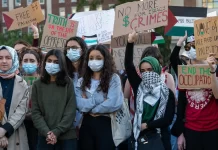Hundreds of Palestinian prisoners on Saturday ended a 40-day hunger strike over their conditions in Israeli jails, the Israel Prisons Service and a Palestinian official said.
About 1,100 inmates had initially taken part in one of the largest such hunger strikes, that began on April 17 and had raised tensions between Israel and the Palestinians, with protests in support of the strikers spilling over into clashes in the occupied West Bank and along the Israel-Gaza border.
More than 800 inmates who had stuck with the hunger strike until Saturday, ended it after talks held with the International Committee for the Red Cross (ICRC) and the Palestinian Authority concluded in an agreement to change some of the prisoners’ conditions, a Prison Service Statement said.
Israel prison service spokeswoman Nicole Englander said 1,578 prisoners participated in the hunger strike overall and 834 ended their fast Saturday. She said 18 were being treated in hospitals.
Issa Karaka, Chairman of Prisoners’ Affairs at the Palestine Liberation Organisation (PLO), confirmed the inmates had agreed to stop the strike.
On Wednesday, the U.N. High Commissioner for Human Rights Zeid Ra’ad al-Hussein urged Israel to improve conditions for Palestinians in its custody.
The ICRC had also warned on Thursday that its doctors who have been visiting the prisoners were concerned about “potential irreversible health consequences”. ICRC spokesman Jesus Serrano welcomed Saturday’s end of the strike and said it would do all it could to facilitate the additional visits.
The resolution of the strike coincided with the start of the Muslim dawn-to-dusk fasting month of Ramadan.
Palestinian president Mahmoud Abbas had urged US counterpart Donald Trump to raise the issue with Israeli Prime Minister Benjamin Netanyahu during his visit to the region earlier this week. He raised the issue again with Trump envoy Jason Greenblatt in a meeting at his headquarters in Ramallah on Thursday.
Both Karaka and the Israeli Prisons Service did not initially divulge the full details of the agreement. However, the Prison Service did say that a second monthly family visit would be reinstated after it had been cut in the past.
Qadoura Fares, who runs the Prisoners’ Club advocacy group, said negotiations took place between Israel officials and a committee from the prisoners, including Marwan Barghouti. He said negotiations began on Friday and were the first since the strike began. He said he had no details on the terms of the deal.
The strike was called by Barghouti, the most high-profile Palestinian jailed in Israel, to protest against solitary confinement and an Israeli practice of detention without trial that has been applied to thousands of prisoners since the 1980s. Israel says that measure is necessary to prevent attacks and protect security sources.
Barghouti, a leader in Palestinian President Mahmoud Abbas’s Fatah movement, was convicted of murder over the killing of Israelis during the second Palestinian intifada, or uprising, and sentenced in 2004 to five life terms. In prison since 2002, he never mounted a defense, saying the court had no jurisdiction over him. Surveys show many Palestinians want him to be their next president.
Earlier this month, Israel released footage it said shows Barghouti breaking his fast. Palestinians say the video is a fabrication.
Israeli Public Security Minister Gilad Erdan had said Barghouti started the strike in order to garner political support on the Palestinian streets rather than improve conditions for his fellow inmates.
The Prisons Service said that most of the inmates on strike were aligned with Fatah.
Although hunger strikes are not uncommon among the 6,500 Palestinians held in Israeli jails, many of whom were convicted of attacks or planning attacks against Israelis, this was one of the largest.
Many Israelis view the prisoners as terrorists and have little sympathy for their demands. Palestinians rallied behind the hunger strikers as national heroes, relishing a rare break from deep divisions between two rival political groups, the Hamas group which runs Gaza and Fatah, the movement of Western-backed Palestinian President Mahmoud Abbas who administers autonomous enclaves in the Israeli-occupied West Bank. Palestinians hoped the protest will draw the attention of a seemingly distracted international community as the Israeli occupation hits the 50-year mark in early June.
Support for the prisoners is an emotional consensus issue; hundreds of thousands of Palestinians have been jailed by Israel at one time or another since 1967.





